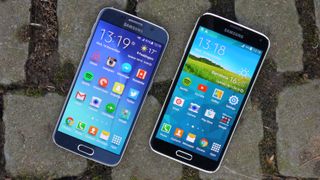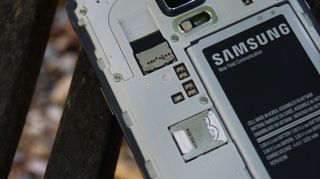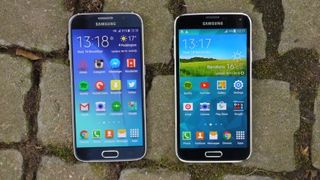Samsung is right to drop microSD until the Galaxy S7
Criticism of the Galaxy S6 last year was wrong

Samsung is rumoured to be bringing back microSD support with the Galaxy S7, and many are cheering its return. However, this isn't a climbdown from Samsung – it was right to drop the slot for the high-spec Galaxy S6 and innovative Galaxy S6 Edge, just as it's right to bring it back now.
When it launched I was excited by the Galaxy S6, but, like the majority of Android fans, gutted at the loss of the microSD support. But our disappointment wasn't warranted, as losing the card made the phone so much better to use.
GSMArena found that in Random Read tests the Galaxy S6 was almost four times quicker than the Galaxy S5. When the Galaxy S5 had a microSD card inside, the Galaxy S6 was a huge 10 times faster – that's an unforgivable difference.
We were all wrong
It's because Samsung introduced a new storage technology on the Galaxy S6 in the form of UFS 2.0 storage. It used 'Command Queue' technology to make communication quicker, and it offered 2.7x faster performance than the Galaxy S5.
There's no other way of saying it: microSD support crippled the Galaxy S5. Instead of trying to find a workaround, Samsung decided to go and make phones with more internal storage for those who needed the extra space, and settle on 32GB for those who don't (the extra cost is another argument).

How rare is it you actually reach the storage limit on a 32GB phone, let alone a 64GB or 128GB version? I could certainly fill a 32GB version with a lot of media downloaded, but I'd really struggle to max out the largest-available version.
So if Samsung was right to get rid of microSD on the Galaxy S6, how is it now the right time to bring it back on the Galaxy S7?
Get daily insight, inspiration and deals in your inbox
Get the hottest deals available in your inbox plus news, reviews, opinion, analysis and more from the TechRadar team.
If Samsung announces the heavily rumoured jump back to expandable storage at its press conference on February 21, many will see it as retreating on its Galaxy S6 policy. But in fact it's the opposite.
Android 6 Marshmallow software brings in a new feature called Adoptable Storage, which means you can lock in a microSD card to your phone, where then you can select an option that enables you to integrate the external storage into the internal storage.

You won't be able to pull the card in and out, as it will be formatted and encrypted just to use on this particular phone as part of the internal storage.
That allows your phone to be much faster than if it was popping over to an 'external' microSD element of the phone to grab the information it needed.
Locked in
If it comes to pass, an expandable slot means you'll be able to buy a 32GB Galaxy S7, but then add in a 64GB microSD card to get a much bigger amount of memory, without anywhere near as much slowdown as there was on the Galaxy S5.
Using Adoptable Storage isn't as fast as the internal memory on your phone, but it's much faster than using a normal microSD card.
Google states on its website, "When a user adopts a new storage device, the platform runs a benchmark and compares its performance against internal storage." If that microSD is much slower than the storage on your phone you'll be warned about it before you enact Adoptable Storage.
Android also notes that other manufacturers have the choice to reject cards altogether if it's not fast enough.

It was a smart idea to avoid microSD technology last year, and now Samsung is making the right decision to bring it in for the Galaxy S7. Just don't mistake it for backtracking - this is the Android market evolving.
But after making a huge show of pointing out how important waterproofing was on the Galaxy S5, dropping it for the S6, then (apparently) bringing it back for the S7? Yeah, that's a bit of a climbdown...
James is Managing Editor for Android Police. Previously, he was Senior Phones Editor for TechRadar, and he has covered smartphones and the mobile space for the best part of a decade bringing you news on all the big announcements from top manufacturers making mobile phones and other portable gadgets. James is often testing out and reviewing the latest and greatest mobile phones, smartwatches, tablets, virtual reality headsets, fitness trackers and more. He once fell over.

